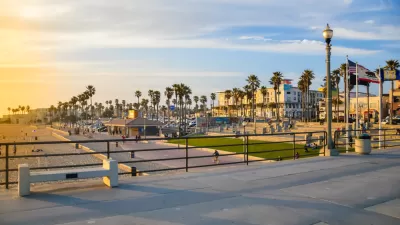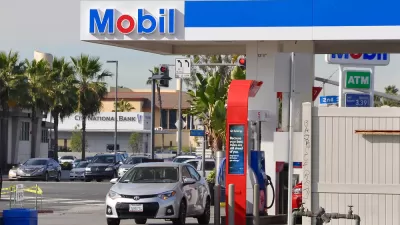Gov. Gavin Newsom signed his first budget, the state's largest ever at $215 billion. Housing activists will be pleased to learn that it has, to use Newsom's terms, both "carrots and sticks" to compel cities to produce more housing.

The $214.8 billion state budget, signed June 21, is Gov. Newsom's first, and the largest in state history, reports John Myers for the Los Angeles Times. The surplus tops $21 billion, reported Adam Ashton for the Sacramento Bee, with "82 percent [going] to a reserve account of which there are a number, pays down (debt) or pre-pays pensions,” said Senate Majority Leader Bob Hertzberg, D-Los Angeles.
“This budget builds record reserves for a rainy day and pays off debt while doing more than any budget in state history to help families tackle challenges of affordability and confront the cost crisis," said Newsom, Senate President pro Tem Toni Atkins (D-San Diego) and Assembly Speaker Anthony Rendon (D-Lakewood) in a five-paragraph joint statement on the agreement.
Myers notes while the Legislature agreed to the bulk of the proposal June 13, there were some issues, particularly how to spend $650 million designated to address homelessness, that prolonged negotiations between Newsom, Atkins and Rendon. Another issue was how to deal with cities that fail to meet their state-mandated regional housing needs allocation, which was noted in the aforementioned statement:
The high cost of housing is chief among the affordability and quality of life challenges families face. Importantly, we have come to agreement on a package of housing measures, one that creates strong incentives – both sticks and carrots – to help spur housing production across this state, all while providing significant levels of funding to fight homelessness.
When Newsom took office in January, he called for a Marshall Plan for affordable housing, threatened to take away a portion of state gas taxes from cities who didn't meet their state-mandated housing goals, and sued Huntington Beach for just that reason. With the support of the state legislature, he hopes to take the next step directed at housing-resistant municipalities
Sticks
According to the agreement, embodied in Senate Bill 102: Housing development and financing, cities and counties that fail to comply with regional housing needs requirements could find themselves being sued by the state, reports Sophia Bollag of The Sacramento Bee in the source article.
If a court finds that a city or county violates a state law that sets targets for how much housing a community must plan to build, the fines could range from $10,000 to $600,000 per month, according to the bill language.
Local governments would have a year to comply before the fines kick in after a court finds them in violation of the law. The fines would increase over time if the local government remains out of compliance.
After six months of fines, the court could take over a local government’s authority over its housing plans.
Carrots
The budget invests $1.75 billion in the production and planning of new housing. SB 102 lays out how the $650 million to address homelessness will be distributed, report Liam Dillon and Taryn Luna for the Los Angeles Times.
The deal, which Gov. Gavin Newsom and legislative leaders agreed to Thursday, gives Los Angeles and a dozen of California’s other largest cities $275 million in state grants for homelessness prevention measures. Counties would receive an additional $175 million, and $190 million more would go to regional agencies known as “continuums of care,” which coordinate services for homeless residents across the state. [$10 million to be allocated later.]
Newsom made lowering the state’s rising housing costs one of his top priorities on the campaign trail, and he has singled out resistance to residential development from cities and counties as one of the key reasons the state doesn’t have enough homes available.
"Newsom and lawmakers have also agreed to create a $1 billion fund to reward communities that pass laws aimed at building more units," adds Bollag. "Those 'pro-housing' local laws could include reduced parking requirements and allowing more multi-unit housing."
Graham Knaus, executive director of the California State Association of Counties, praised the agreement for increasing homelessness funding for counties but criticized the harsh punishments for jurisdictions that aren’t meeting their housing goals.
“We find the new penalties on local governments already struggling to add housing and address homelessness concerning,” he said in a statement. “Nonetheless, California’s 58 counties stand ready and committed to meet this challenge.”
SB 102 passed the Senate on April 11. With the amendments added on June 27, it goes to the Assembly Committee on Budget this week.
Additional reading:
- Curbed SF: California will sue, fine cities that don’t build enough housing, June 28
- CALmatters: California’s new housing budget is a wrap. Here’s what you need to know, June 27
- CALmatters: Lawmakers—cutting big checks to combat the housing crisis—fight over who gets the money (plus housing crisis podcast), June 24
Related in Planetizen:
-
New California Governor Follows Up Tough Housing Rhetoric with Action – Sues Huntington Beach, January 30, 2019
-
California Needs a Marshall Plan for Housing, According to New Governor, January 10, 2019
Hat tip to John Kevranian.
FULL STORY: California cities face $600K fines if they break state housing law in Newsom’s budget deal

Maui's Vacation Rental Debate Turns Ugly
Verbal attacks, misinformation campaigns and fistfights plague a high-stakes debate to convert thousands of vacation rentals into long-term housing.

Planetizen Federal Action Tracker
A weekly monitor of how Trump’s orders and actions are impacting planners and planning in America.

In Urban Planning, AI Prompting Could be the New Design Thinking
Creativity has long been key to great urban design. What if we see AI as our new creative partner?

King County Supportive Housing Program Offers Hope for Unhoused Residents
The county is taking a ‘Housing First’ approach that prioritizes getting people into housing, then offering wraparound supportive services.

Researchers Use AI to Get Clearer Picture of US Housing
Analysts are using artificial intelligence to supercharge their research by allowing them to comb through data faster. Though these AI tools can be error prone, they save time and housing researchers are optimistic about the future.

Making Shared Micromobility More Inclusive
Cities and shared mobility system operators can do more to include people with disabilities in planning and operations, per a new report.
Urban Design for Planners 1: Software Tools
This six-course series explores essential urban design concepts using open source software and equips planners with the tools they need to participate fully in the urban design process.
Planning for Universal Design
Learn the tools for implementing Universal Design in planning regulations.
planning NEXT
Appalachian Highlands Housing Partners
Mpact (founded as Rail~Volution)
City of Camden Redevelopment Agency
City of Astoria
City of Portland
City of Laramie





























